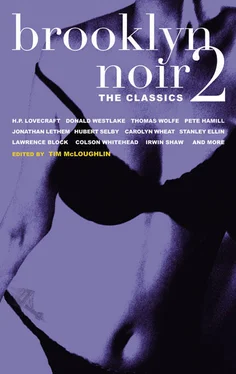H. Lovecraft - Brooklyn Noir 2
Здесь есть возможность читать онлайн «H. Lovecraft - Brooklyn Noir 2» весь текст электронной книги совершенно бесплатно (целиком полную версию без сокращений). В некоторых случаях можно слушать аудио, скачать через торрент в формате fb2 и присутствует краткое содержание. Год выпуска: 2005, ISBN: 2005, Издательство: Akashic Books, Жанр: Детектив, на английском языке. Описание произведения, (предисловие) а так же отзывы посетителей доступны на портале библиотеки ЛибКат.
- Название:Brooklyn Noir 2
- Автор:
- Издательство:Akashic Books
- Жанр:
- Год:2005
- ISBN:978-1888451764
- Рейтинг книги:4 / 5. Голосов: 1
-
Избранное:Добавить в избранное
- Отзывы:
-
Ваша оценка:
- 80
- 1
- 2
- 3
- 4
- 5
Brooklyn Noir 2: краткое содержание, описание и аннотация
Предлагаем к чтению аннотацию, описание, краткое содержание или предисловие (зависит от того, что написал сам автор книги «Brooklyn Noir 2»). Если вы не нашли необходимую информацию о книге — напишите в комментариях, мы постараемся отыскать её.
Brooklyn Noir 2 — читать онлайн бесплатно полную книгу (весь текст) целиком
Ниже представлен текст книги, разбитый по страницам. Система сохранения места последней прочитанной страницы, позволяет с удобством читать онлайн бесплатно книгу «Brooklyn Noir 2», без необходимости каждый раз заново искать на чём Вы остановились. Поставьте закладку, и сможете в любой момент перейти на страницу, на которой закончили чтение.
Интервал:
Закладка:
“I know what you mean. That isn’t like him. I don’t imagine Perkins would ever feel remorse or guilt. I should think he would be one of the people who believes the only crime is in being caught.”
“Yet we didn’t catch him. He came to us.” Levine studied the book titles on the shelf behind Stonegell. “What about their mental attitudes recently?” he asked. “Generally speaking, I mean. Were they happy or unhappy, impatient or content or what?”
“I think they were both rather depressed, actually,” said Stonegell. “Though for somewhat different reasons. They had both come out of the Army less than a year ago, and had come to New York to try to make their mark as writers. Gruber was having difficulty with subject matter. We talked about it a few times. He couldn’t find anything he really wanted to write about, nothing he felt strongly enough to give him direction in his writing.”
“And Perkins?”
“He wasn’t particularly worried about writing in that way. He was, as I say, deft and clever in his writing, but it was all too shallow. I think they might have been bad for one another, actually. Perkins could see that Gruber had the depth and sincerity that he lacked, and Gruber thought that Perkins was free from the soul-searching and self-doubt that was hampering him so much. In the last month or so, both of them have talked about dropping out of school, going back home and forgetting about the whole thing. But neither of them could have done that, at least not yet. Gruber couldn’t have, because the desire to write was too strong in him. Perkins couldn’t, because the desire to be a famous writer was too strong.”
“A year seems like a pretty short time to get all that depressed,” said Levine.
Stonegell smiled. “When you’re young,” he said, “a year can be eternity. Patience is an attribute of the old.”
“I suppose you’re right. What about girl friends, other people who knew them both?”
“Well, there was one girl whom both were dating rather steadily. The rivalry again. I don’t think either of them was particularly serious about her, but both of them wanted to take her away from the other one.”
“Do you know this girl’s name?”
“Yes, of course. She was in the same class with Perkins and Gruber. I think I might have her home address here.”
Stonegell opened a small file drawer atop his desk, and looked through it. “Yes, here it is,” he said. “Her name is Anne Marie Stone, and she lives on Grove Street, down in the Village. Here you are.”
Levine accepted the card from Stonegell, copied the name and address onto his pad, and gave the card back. He got to his feet. “Thank you for your trouble,” he said.
“Not at all,” said Stonegell, standing. He extended his hand, and Levine, shaking it, found it bony and almost parchment-thin, but surprisingly strong. “I don’t know if I’ve been much help, though,” he said.
“Neither do I, yet,” said Levine. “I may be just wasting both our time. Perkins confessed, after all.”
“Still—” said Stonegell.
Levine nodded. “I know. That’s what’s got me doing extra work.”
“I’m still thinking of this thing as though — as though it were a story problem, if you know what I mean. It isn’t real yet. Two young students, I’ve taken an interest in both of them, fifty years after the worms get me they’ll still be around — and then you tell me one of them is already wormfood, and the other one is effectively just as dead. It isn’t real to me yet. They won’t be in class tomorrow night, but I still won’t believe it.”
“I know what you mean.”
“Let me know if anything happens, will you?”
“Of course.”
Anne Marie Stone lived in an apartment on the fifth floor of a walk-up on Grove Street in Greenwich Village, a block and a half from Sheridan Square. Levine found himself out of breath by the time he reached the third floor, and he stopped for a minute to get his wind back and to slow the pounding of his heart. There was no sound in the world quite as loud as the beating of his own heart these days, and when that beating grew too rapid or too irregular, Detective Levine felt a kind of panic that twenty-four years as a cop had never been able to produce.
He had to stop again at the fourth floor, and he remembered with envy what a Bostonian friend had told him about a City of Boston regulation that buildings used as residence had to have elevators if they were more than four stories high. Oh, to live in Boston. Or, even better, in Levittown, where there isn’t a building higher than two stories anywhere.
He reached the fifth floor, finally, and knocked on the door of apartment 5B. Rustlings from within culminated in the peephole in the door being opened, and a blue eye peered suspiciously out at him. “Who is it?” asked a muffled voice.
“Police,” said Levine. He dragged out his wallet, and held it high, so the eye in the peephole could read the identification.
“Second,” said the muffled voice, and the peephole closed. A seemingly endless series of rattles and clicks indicated locks being released, and then the door opened, and a short, slender girl, dressed in pink toreador pants, gray bulky sweater and blonde pony tail, motioned to Levine to come in. “Have a seat,” she said, closing the door after him.
“Thank you.” Levine sat in a new-fangled basket chair, as uncomfortable as it looked, and the girl sat in another chair of the same type, facing him. But she managed to look comfortable in the thing.
“Is this something I did?” she asked him. “Jaywalking or something?”
Levine smiled. No matter how innocent, a citizen always presumes himself guilty when the police come calling. “No,” he said. “It concerns two friends of yours, Al Gruber and Larry Perkins.”
“Those two?” The girl seemed calm, though curious, but not at all worried or apprehensive. She was still thinking in terms of something no more serious than jaywalking or a neighbor calling the police to complain about loud noises. “What are they up to?”
“How close are you to them?”
The girl shrugged. “I’ve gone out with both of them, that’s all. We all take courses at Columbia. They’re both nice guys, but there’s nothing serious, you know. Not with either of them.”
“I don’t know how to say this,” said Levine, “except the blunt way. Early this afternoon, Perkins turned himself in and admitted he’d just killed Gruber.”
The girl stared at him. Twice, she opened her mouth to speak, but both times she closed it again. The silence lengthened, and Levine wondered belatedly if the girl had been telling the truth, if perhaps there had been something serious in her relationship with one of the boys after all. Then she blinked and looked away from him, clearing her throat. She stared out the window for a second, then looked back and said, “He’s pulling your leg.”
Levine shook his head. “I’m afraid not.”
“Larry’s got a weird sense of humor sometimes,” she said. “It’s a sick joke, that’s all. Al’s still around. You haven’t found the body, have you?”
“I’m afraid we have. He was poisoned, and Perkins admitted he was the one who gave him the poison.”
“That little bottle Al had around the place? That was only a gag.”
“Not anymore.”
She thought about it a minute longer, then shrugged, as though giving up the struggle to either believe or disbelieve. “Why come to me?” she asked him.
“I’m not sure, to tell you the truth. Something smells wrong about the case, and I don’t know what. There isn’t any logic to it. I can’t get through to Perkins, and it’s too late to get through to Gruber. But I’ve got to get to know them both, if I’m going to understand what happened.”
Читать дальшеИнтервал:
Закладка:
Похожие книги на «Brooklyn Noir 2»
Представляем Вашему вниманию похожие книги на «Brooklyn Noir 2» списком для выбора. Мы отобрали схожую по названию и смыслу литературу в надежде предоставить читателям больше вариантов отыскать новые, интересные, ещё непрочитанные произведения.
Обсуждение, отзывы о книге «Brooklyn Noir 2» и просто собственные мнения читателей. Оставьте ваши комментарии, напишите, что Вы думаете о произведении, его смысле или главных героях. Укажите что конкретно понравилось, а что нет, и почему Вы так считаете.












